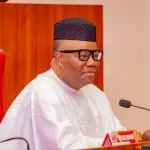
Sand Filling for High-end Real Estate Projects is the Major Factor for Flooding in Lagos – GRV

The debate over the root causes of Lagos’ flooding has once again resurfaced as Gbadebo Rhodes-Vivour, Labour Party gubernatorial candidate in Lagos, took to X to highlight the impact of unregulated land reclamation on Lagos’ flooding crisis.
According to him, sand filling—particularly for high-end real estate projects—has not only exacerbated flooding but has also led to the mass displacement of indigenous communities that have existed for over 200 years.
x/@GRVlagos
It will be recalled that the Lagos State government, through the Commissioner for Environment and Water Resources, Tokunbo Wahab, attributed flooding around Olopo Meji inward 3rd Mainland to prolonged rainfall and high tidal levels in the lagoon in July 2024.
Rhodes-Vivour argued that the government’s approach to preventing flooding is mainly reactive and fails to address the underlying issue: the continuous sand-filling of wetlands and coastal areas to create artificial land for urban development.
He pointed out that over the past decade, Lagos has witnessed an aggressive push for land reclamation, particularly in high-value areas such as Banana Island, Eko Atlantic City, and Ibeju-Lekki. While these projects cater to luxury real estate and commercial developments, he warned that they disrupt natural water retention areas, increase surface runoff, and contribute to urban flooding.
Rhodes-Vivour also noted that the displacement of Indigenous communities in areas such as Ibeju-Lekki further highlights the socio-economic consequences of unchecked urban expansion.
Not only will this development lead to massive flooding of the Lagos mainland LG, it is also displacing indigenous communities that have existed here for over 200 years ,’’ he wrote.
In response to one of the flooding situations last year, Wahab reassured residents that the flooding around Olopo Meji inward 3rd Mainland was temporary and would subside within a few hours once the tidal level receded. He also emphasised ongoing efforts by the Lagos State government to combat flash flooding and address environmental infractions but failed to mention the impacts of sand filling as a key factor for flooding.
Before now, Rhodes-Vivour had raised questions about the claim by Dangote Group CEO Aliko Dangote that he paid $100 million for the land his refinery sat on. In a post on X, he pointed out that the $100 million could have been transformative for the Ibeju Lekki axis.
A good part of this amount could have built a tram to connect Ibeju to CMS, opening up the entire corridor to more investments. It could have built a hospitality management school to empower young people with the right skills to flourish in the hospitality sector – the fastest growing sector in Lekki,” he stated.
Read More:
- Senate President Akpabio Faces 24 Corruption Allegations With No Convictions – Knowdemwell
- Burkina Faso Bans All NGO Activity Without Government Permission
About The Author
Related Articles
Asake Sets New Billboard Afrobeats Record as Chart Presence Grows
Asake has further cemented his place as one of Afrobeats’ most dominant...
ByWest Africa WeeklyJanuary 29, 2026Nigerians Lament PayPal’s Return as Old Wounds Resurface
PayPal’s reentry into Nigeria through a partnership with local fintech company Paga...
ByWest Africa WeeklyJanuary 29, 2026Tanzania Eyes Gold Sales as Aid Declines and Infrastructure Needs Grow
Tanzania is weighing plans to sell part of its gold reserves to...
ByWest Africa WeeklyJanuary 29, 2026Mali Tightens Grip on Explosives Supply With New Majority Stake
The Malian government has taken majority ownership of a civil explosives manufacturing...
ByWest Africa WeeklyJanuary 29, 2026













Leave a comment